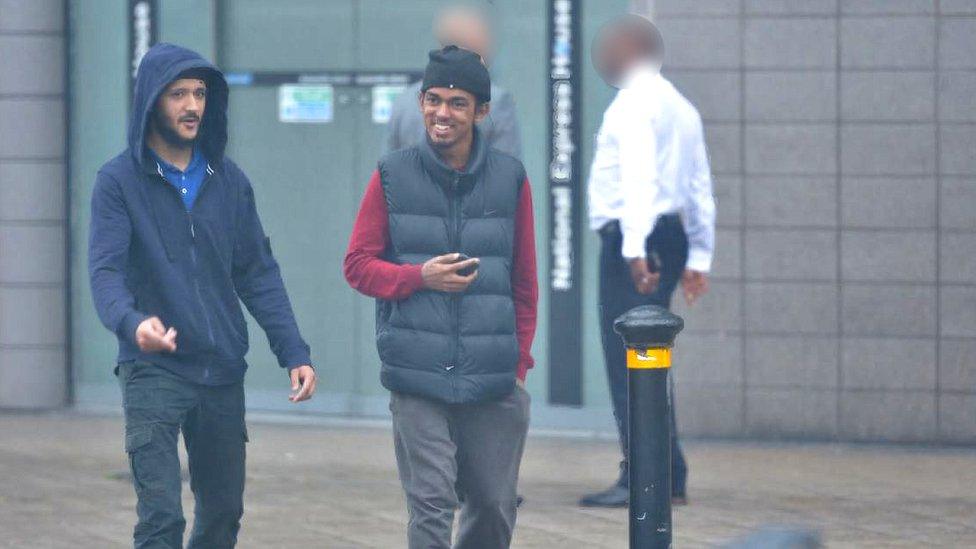Aqib Imran: Learning difficulties student guilty of terror plan
- Published

Imran (left) meeting with Naa'imur Rahman, previously convicted
A student who told an undercover MI5 officer he wanted to travel to fight in Libya has been found guilty of preparing an act of terrorism.
Aqib Imran, 22, from Birmingham, was convicted after an Old Bailey retrial.
During the trial, Imran denied having terrorist intentions, saying he had been sucked into a fantasy that began when he was attracted to a girl online.
The jury heard the 22-year-old had educational difficulties and had left school with no GCSEs.
His college had provided him with a dedicated assistance teacher to help him complete a course which would lead to work in social care.
By the early Autumn of 2017 Imran, from Sparkbrook in Birmingham, had met another man, Naa'imur Rahman, online.

Naa'imur Rahman: Convicted in August 2018 of plot to kill prime minister
Rahman, 21, and originally from Walsall, had been radicalised by his uncle who was, by then, fighting with the Islamic State group in Syria.
Prosecutors told the Old Bailey that Imran and his new friend Rahman began talking online to people whom they both thought were commanders from the Islamic State group.
But the mysterious personas were in fact a series of undercover investigators, starting with one from the FBI and eventually officers from the UK's MI5.
Both agencies have been increasingly deploying online "role players" to identify potentially violent suspects who are seeking to fight overseas or carry out acts of terrorism at home.
Rahman told investigators he wanted to kill the prime minister - and he was convicted of that plot last August after an extraordinary undercover operation involving a fake bomb-maker.
Aqib Imran was not part of Rahman's attack plan - but prosecutors say he wanted to travel to Libya to fight, or possibly Jordan with the aim of reaching Syria.
They alleged he gathered cash for travel and discussed with one of the undercover officers how he would get hold of a fake passport.

Prosecutors say Imran became involved in online extremism
He also downloaded an infamous jihadi guidebook which gives tips to would-be fighters and travellers - and before his arrest Rahman had sent a video to his friend to act as an introduction to IS recruiters.
But Imran's defence team told the Old Bailey that the student did nothing to further what amounted to a fantasy of a troubled young man.
The jury heard Imran's interest in travelling had been sparked by an online crush on someone he only knew as "Aisha".
This supposed woman - whom he never met - was purportedly in Denmark and they discussed travelling together to the Middle East.
The trial heard no evidence about the real identity of Aisha - but she provided Imran with the initial contact who turned out to be an undercover investigator offering to help Imran get a fake passport.
While he shared a picture of his current passport with an undercover investigator, Imran told his trial he never handed over any money for a forged document, despite having savings to do so, or sent pictures of himself required to create a fake.
The jury heard that Imran then stopped communicating with the MI5 investigator - while his friend Rahman separately continued his own contact.
Following Imran's first trial, a jury convicted him of possessing the jihadi manual - but were split on the more serious charge of preparing for an act of terrorism by intending to travel to overseas.